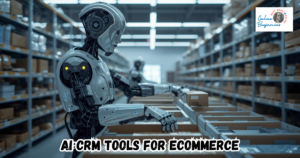In the digital age, ecommerce has become a popular business model, providing unparalleled opportunities for businesses of all sizes to grow and expand their reach. Whether you’re a small startup on Shopify, or a well-established brand like WalMart, the potential to expand your operations and reach a global market is right at your fingertips.
But with great opportunity comes the need for strategic planning and execution if you want to be successful. This isn’t just about increasing sales; it’s about how to scale your ecommerce business in a way that’s sustainable, profitable, and long-term.
QUICK LOOK: 8 Strategies to Scale Ecommerce
- A Quality Ecommerce Platform – this is your foundation, choose a platform that has the tools and capabilities to handle and facilitate your growth. Things like mobile usability, and cyber security are a must.
- Personalized Marketing – personalized emails, customized recommendations, coupons, and discounts will help build long-term repeat customers.
- Streamline Your UX – make sure your order processes are seamless, your page loads are fast and you have multi-language capabilities. Have clear return policies and you handle customer concerns quickly and efficiently.
- Solicit Customer Feedback – Customer surveys, reviews, and yes complaints can all be used to make improvements that can accelerate your growth.
- Proper Inventory Management – You can’t sell it if you don’t have it, and if you are stocking products that aren’t selling, you will put a strain on your finances needed for growth.
- Streamline Your Order Fulfillment – Fast, efficient order fulfillment will keep your customers happy and avoid confusion and complaints that come with delayed or incorrect orders.
- Customer Service is Job 1 – Remember the first rule of business: The customer is always right. and the second rule: If the customer is wrong, see rule number 1. Keep your customers happy if you want to successfully scale your business.
- Automation can be Your Friend – automation software can help with processes like order fulfillment, returns, and customer communication. Then you and your team can focus on tasks that require a more personal touch and build the customer relationship.
So why is it critical to scale your ecommerce business with care? Simply put, hasty expansion can strain your resources, alienate your customers, and ultimately, cause more harm than good. On the flip side, ecommerce businesses that approach scaling carefully and thoughtfully often thrive.
They’re the ones who manage to navigate through the ups and downs of business growth while maintaining a stellar customer experience and consistent operational efficiency and profitability. Take, for example, the stories of small startup enterprises that transformed into ecommerce giants.
These companies didn’t just ride the wave of digital commerce; they engineered their own growth. Through careful planning, investments in the right technology, and a keen focus on customer satisfaction, they found a winning strategy for scaling up. And if you’re wondering how you can do the same, you’re in the right place.
The journey to scale your ecommerce business begins with a solid foundation. You can’t build a skyscraper on sand and expect it to stand against the storm. In the same vein, preparing your business to grow requires a robust infrastructure and technological backing.
Come along as we take an in-depth look at the essential tech investments and structural enhancements you should consider to safely and successfully scale your ecommerce business to new heights of profitability and sustainability.
Technology and Infrastructure Foundation for How to Scale Your Ecommerce Business
Scaling an ecommerce business successfully will require upgrading your technology and infrastructure to handle growth without a hitch. Think of it like this: if your ecommerce platform is the skeleton of your business, then your hosting solution is the muscle, both need to be strong to support your expansion.
The ecommerce platform you choose must be flexible. Platforms like Shopify, Magento, and WooCommerce offer scalable options that can grow with your business. They offer important scaling capabilities like handling a surge in traffic to adding new features and technologies without getting bogged down or worse breaking down.
In addition to today’s needs, consider what you will be needing in the future as your ecommerce business grows and expands. You need a platform that can introduce international currencies, automate tax calculations, or integrate seamlessly with other business applications.
Next, if you are serious about scaling any business, you need to focus on mobile optimization. In my opinion, if your site isn’t friendly to a smartphone user, you’re not ready to scale. Mobile ecommerce, or m-commerce, is swiftly dominating the online shopping world.
Most, approximately 70%, of internet traffic is now through smartphones. Ensuring your website is responsive and loads quickly on all devices isn’t just nice to have, it’s a business imperative. Your ecommerce platform must be optimized for mobile devices.

Another consideration when scaling your ecommerce business is omni-channel presence. This isn’t just about selling on multiple platforms; it’s also about providing a cohesive brand experience wherever your customers are shopping across all platforms. Whether it’s on a mobile app, social media, or a brick-and-mortar store, the customer experience should be seamless.
And, whatever you do, don’t forget about cybersecurity. It is the unsung hero of scaling. A single security breach can undermine customers’ trust and derail your growth even damage your brand beyond repair. Implementing robust security measures, like SSL certificates and data encryption, protects not just your data but also your reputation.
With a strong foundation in place, you can confidently proceed with scaling your ecommerce business. Remember that your technology and infrastructure are pivotal in not just reacting to growth, but in driving it. Next, we’re going to dive into the customer-centric strategies that can truly enhance user experience and fuel your growth.
Customer-Centric Strategies and Enhancing User Experience
A customer-centric approach is the linchpin of How to scale your ecommerce business. It’s all about understanding and catering to your customer’s needs and preferences. Your online store is not just a place to sell products; it’s an opportunity to create a positive and memorable shopping experience that builds customer relationships and keeps them coming back.
Personalized marketing is a powerful tool in today’s ecommerce playbook. Using customer data to tailor your marketing efforts, can significantly boost customer retention. Things like personalized emails, product recommendations, and user-specific discounts can transform a one-time buyer into a lifelong customer.
It’s important to consider the design and functionality of your website as it can directly influence conversion rates. If you want to scale, it’s vital to streamline both the user interface (UI) and user experience (UX).
From lightning-fast page loads to intuitive navigation, every touchpoint should be optimized for simplicity and convenience. Moreover, accommodating different languages and currencies can be a gateway to international markets. Remember, you want customers to give you their money, make it as easy as possible for them to do so.
Don’t forget about soliciting customer feedback; it’s a gold mine. Encouraging reviews and ratings, and actively engaging with customers through surveys can provide insights into their needs and pain points. Addressing these and making continuous improvements is what will differentiate your brand and drive innovation, growth, and profits.
Optimizing Your Operations From Logistics to Customer Service
How to Scale your ecommerce business isn’t just about boosting sales – it’s also about how to handle increased order volumes without dropping the ball. Let’s take a look at how you can make sure your operations can keep up with your growth.
Proper inventory management is foundational. You can’t sell what you don’t have, and you don’t want to stockpile what you can’t sell. Smart inventory tools help avoid both overstocking and stockouts. Consider technologies and tools that forecast demand based on historical sales data.

Next up, your fulfillment processes need to be fast and efficient. Delayed shipping is a surefire way to upset customers. Evaluate your packaging and shipping partners, streamline your distribution centers, and always have a backup plan. Streamline your return policies and procedures as well.
Customer service is pivotal – it can make or break your relationship with customers. As you scale, your customer service team must scale too. Train them well and ensure they embody empathy and efficiency. If you outsource customer service be sure to communicate your requirements and expectations.
Automation is your friend. To scale effectively, lean on software for processes like order tracking, customer communication, and returns management. The new AI technologies are great for handling numerous mundane tasks. This lets your team focus on tasks that require a human touch, enhancing overall productivity and ensuring sustainable growth.
Continuing the Momentum when Scaling Your Ecommerce Business
Remember, scaling your ecommerce business isn’t a one-and-done deal. It’s a continuous process, with learning and adapting playing a huge role. You’ve laid the groundwork, optimized operations, and ramped up your marketing—now, it’s about keeping that growth engine purring.
KEY TAKEAWAYS:
Prepare your people, processes, and ecommerce platform for your expected growth. Keep your business customer-focused by making sure you handle orders, returns, and customer concerns/feedback in an efficient and timely manner. And remember, adaptability isn’t just a buzzword; it’s your business’s lifeline. The online market is ever-evolving, and staying ahead means staying alert and being ready to pivot when necessary. Keep an eye on emerging trends, technologies, and customer behaviors, and incorporate what you learn into your operations.
Fostering a culture of innovation is crucial. Encourage your team to think outside the box and reward creative problem-solving. Innovation isn’t only about product development; it can apply to any aspect of your business, from marketing tactics to customer service methodologies.
Finally, set new goals regularly. Analyze what’s working and what isn’t, and don’t be afraid to switch tactics. Celebrate your wins, learn from your losses, and always keep an eye on the big picture. With sustained effort and strategic planning, you’ll be poised to not only reach but surpass your scaling goals.
Related Articles:
- How To Build A Successful TikTok Shop

- AI CRM Tools For Ecommerce

- Leveraging AI For Effective Inventory Management

I’m Looking forward to working with you,

- onlinebenjamins.com
- thebeachangler.com
- thesinnerinthemirror.com
- my.wealthyaffiliate.com/rex10
- Facebook: Online Benjamins
- Twitter: @onlinebenjamin1
- Instagram: dotcomdinero
Rex
P.S. If you have any questions or are unsure of anything, I am here and I promise I will get back to you on all of your questions and comments. Just leave them below in the comment section. Follow me on Twitter: @onlinebenjamin1, Instagram: dotcomdinero, and Facebook: Online Benjamins
Hi,
Thanks for stopping by and congratulations for taking the first steps to building your own online business. I’ve been in business both offline and online since 1997. I would consider it an honor to help you build your business. Father of 3, life long outdoorsman with an education in Genetics and Economics. This site is about cutting through the BS and finding the real opportunities in the online world. I look forward to working with you.



